Tooth pain from sensitive teeth, bleeding gums, or an affected tooth can strike anytime — disrupting your day and leaving you desperate for relief. Whether it stems from tooth decay or another issue, the discomfort can quickly worsen without action. While you should always see a dentist for ongoing symptoms, this guide covers fast-acting solutions, including OTC pain relievers, natural remedies, and tips to reduce inflammation. These remedies can ease pain in minutes and help you manage discomfort until professional care is available.
Key Takeaways
-
Over-the-counter pain relievers like ibuprofen and acetaminophen can provide quick relief from tooth pain, but do not address underlying issues.
-
Natural remedies such as cold compresses, saltwater rinses, clove oil, garlic, and hydrogen peroxide can temporarily alleviate tooth pain and are easy to apply at home.
-
Seek professional dental care for persistent or severe tooth pain, especially if accompanied by symptoms like swelling, fever, or difficulty swallowing.
Over-the-Counter Pain Relievers
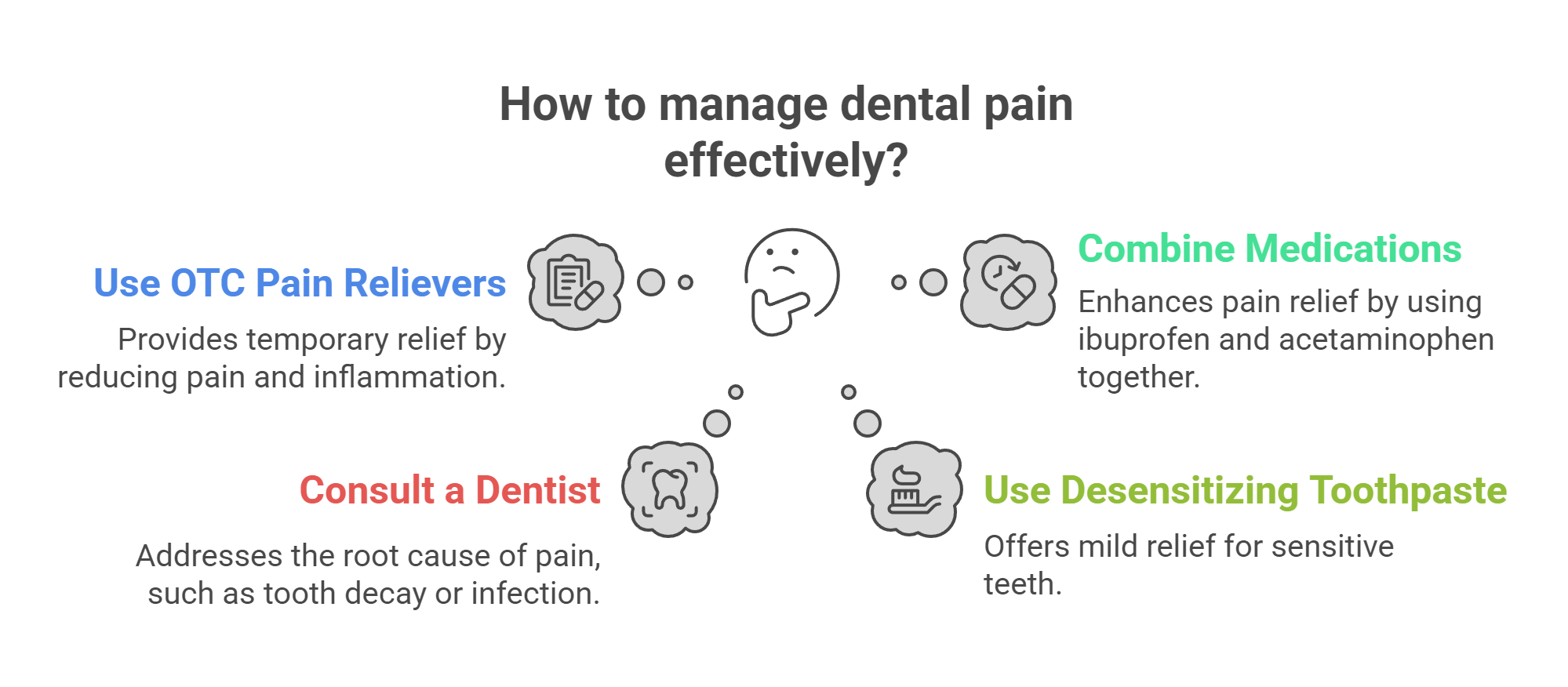
When you're dealing with a dental problem, one of the fastest ways to manage discomfort is by using OTC pain relievers. Medications like ibuprofen and acetaminophen are highly effective in reducing pain and blocking pain signals from the painful area.
-
Ibuprofen is a nonsteroidal anti-inflammatory drug (NSAID) that works well to reduce inflammation and ease dental discomfort. It can be taken every 4 to 6 hours, following your dentist’s recommended dose.
-
Acetaminophen is another reliable option, especially when combined with ibuprofen for enhanced relief. However, do not exceed the daily limit of 4,000 mg to avoid liver damage.
For safe use:
-
Always swallow these medications with water—do not place them directly on the painful area, as this may cause irritation.
-
If the pain lingers, it may indicate an underlying cause such as tooth decay or infection. In that case, it's crucial to see a dentist to address the root cause, rather than just masking symptoms.
Note: Avoid benzocaine-based gels, especially in children, as they have been linked to a rare but serious condition called methemoglobinemia.
While OTC medications can offer temporary comfort, they are not a cure. Use them wisely and avoid chewing on the affected side to prevent worsening the issue. Pairing these with options like desensitizing toothpaste or vanilla extract for mild relief may also help—but only as short-term solutions. If your pain continues or comes with a bad taste, swelling, or fever, consult your dentist immediately.
Cold Compress for Immediate Relief

A cold compress is a quick, effective natural remedy for easing tooth pain, particularly when applied to the affected area. Cold therapy works by constricting blood vessels, which helps reduce inflammation, minimize swelling, and numb the pain.
To use this method:
-
Wrap an ice pack or a bag of frozen peas in a towel.
-
Apply it gently to the outside of your cheek near the affected area for 15–20 minutes.
-
Repeat every few hours, especially within the first 24–36 hours after the pain starts.
For additional relief, you can also press ice between your thumb and forefinger (on the same side as the painful tooth). This acupressure technique targets nerve pathways and may help relieve discomfort by reducing nerve sensitivity.
Though this method provides temporary relief, take breaks between applications to avoid skin irritation or frostbite. A cold compress is one of many home remedies that can help prevent toothaches from worsening until professional care is available.
You can combine cold therapy with other safe practices, like rinsing with a saltwater rinse to fight plaque buildup or using fluoride toothpaste daily to support long-term dental health. However, avoid using remedies incorrectly—never swallow hydrogen peroxide, and always follow safety guidelines when trying at-home treatments.
For lasting protection, stick to soft foods while experiencing discomfort and see a dentist regularly to address any underlying issues, such as bacterial infections.
Saltwater Rinse: A Simple Home Remedy
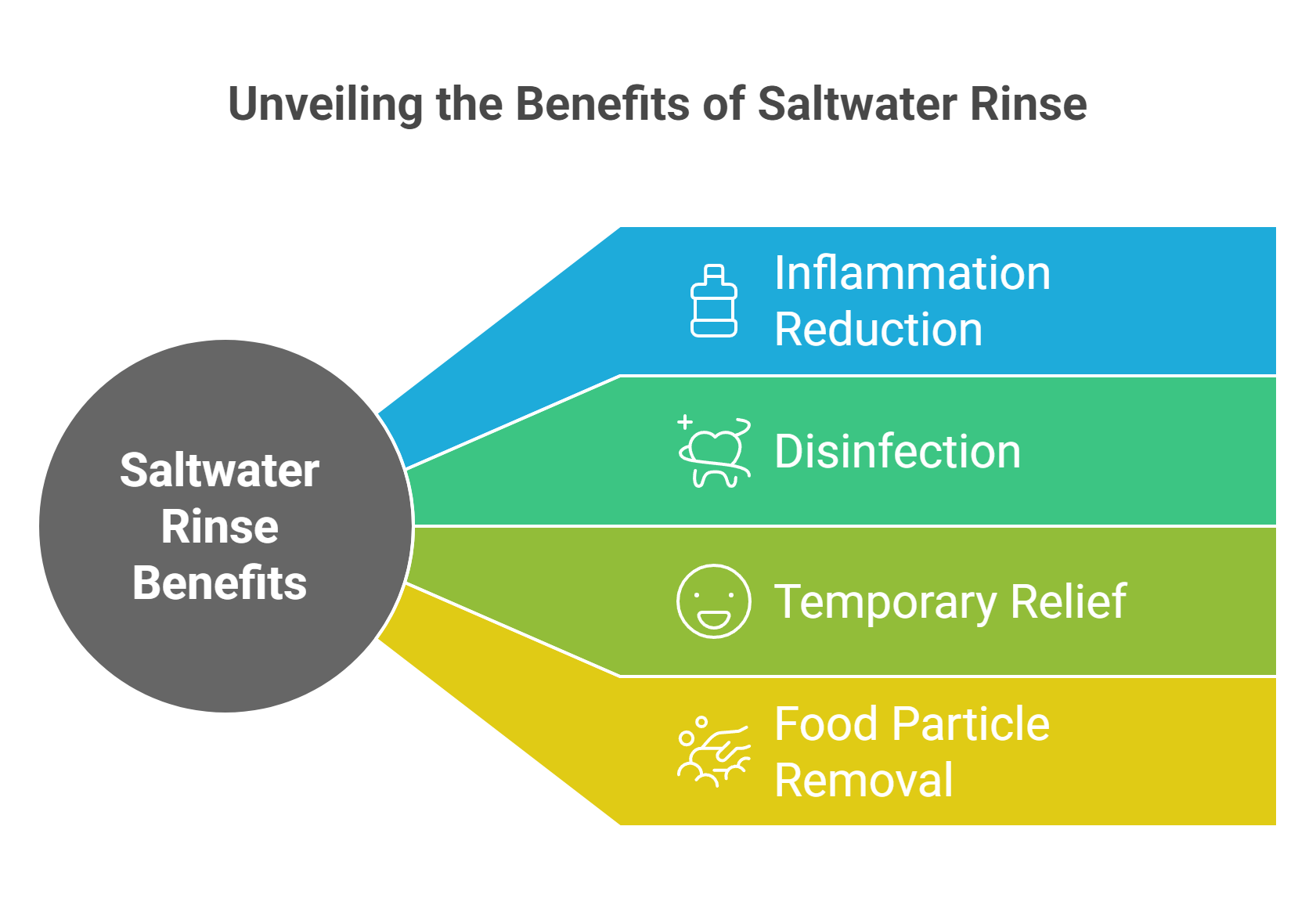
A saltwater rinse is a simple and effective home remedy for tooth pain relief. This natural antiseptic can help reduce inflammation, disinfect the mouth, and provide temporary relief from toothache remedies. Chamomile tea can help reduce swelling and inflammation in the gums, providing comfort for tooth pain. To prepare and use a saltwater rinse:
-
Mix half a teaspoon of salt into 8 ounces of warm water.
-
Swish the solution in your mouth for about 30 seconds.
-
Repeat this process up to 4-5 times daily.
Salt water acts as a natural disinfectant, reducing bacteria and inflammation while helping to dislodge food particles that may be causing irritation. This simple remedy can be especially beneficial when dealing with minor infections or gum inflammation. It’s an easy way to manage discomfort at home without additional medications.
Avoid using saltwater rinses if there’s an open nerve or cavity, as this could worsen the condition. For most people, a saltwater rinse offers immediate relief while promoting oral hygiene.
Clove Oil: Nature’s Numbing Agent
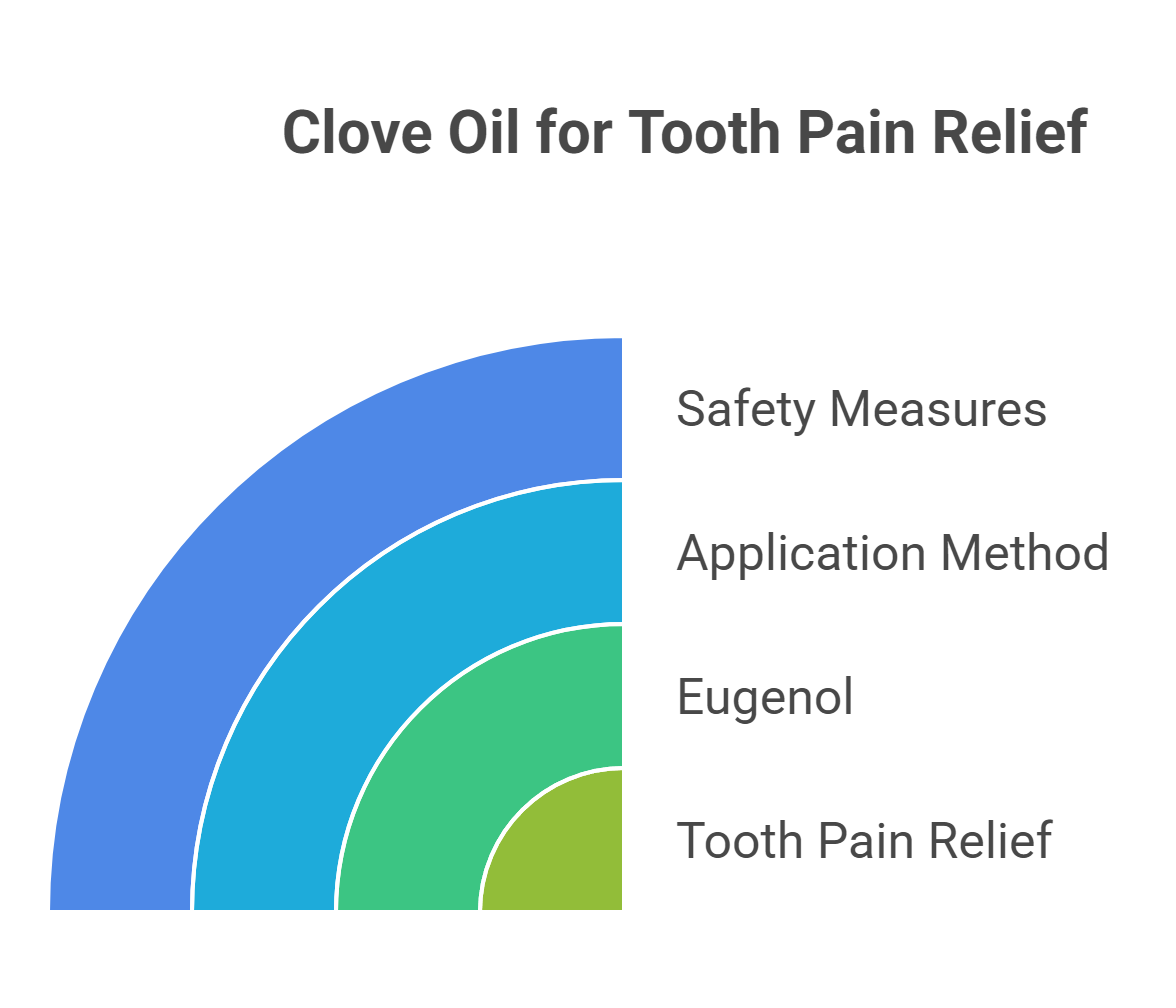
Clove oil has been used for centuries as a natural remedy for tooth pain. This essential oil contains eugenol, a compound with powerful anti-inflammatory and numbing properties that can provide temporary relief from a toothache. Tea bag compresses can relieve tooth pain due to the tannins in tea, which have antibacterial properties. To use clove oil safely:
-
Soak a cotton ball in diluted clove oil.
-
Place the cotton ball directly on the affected area.
-
Use a carrier oil when mixing clove oil to avoid irritation.
-
Ensure safe application on the skin by diluting properly.
The application of clove oil can numb the painful area within minutes, making it an effective solution for managing tooth pain. Clove oil’s natural antiseptic properties also help to reduce bacteria in the mouth, which can be beneficial in preventing infections. This makes clove oil a versatile and potent remedy for those seeking natural alternatives to OTC pain relievers.
Clove oil offers quick pain relief and can be easily applied at home, making it a fantastic natural remedy. However, if the pain persists, it is crucial to consult a dentist to address the underlying issue.
Hydrogen Peroxide Rinse for Infection Control
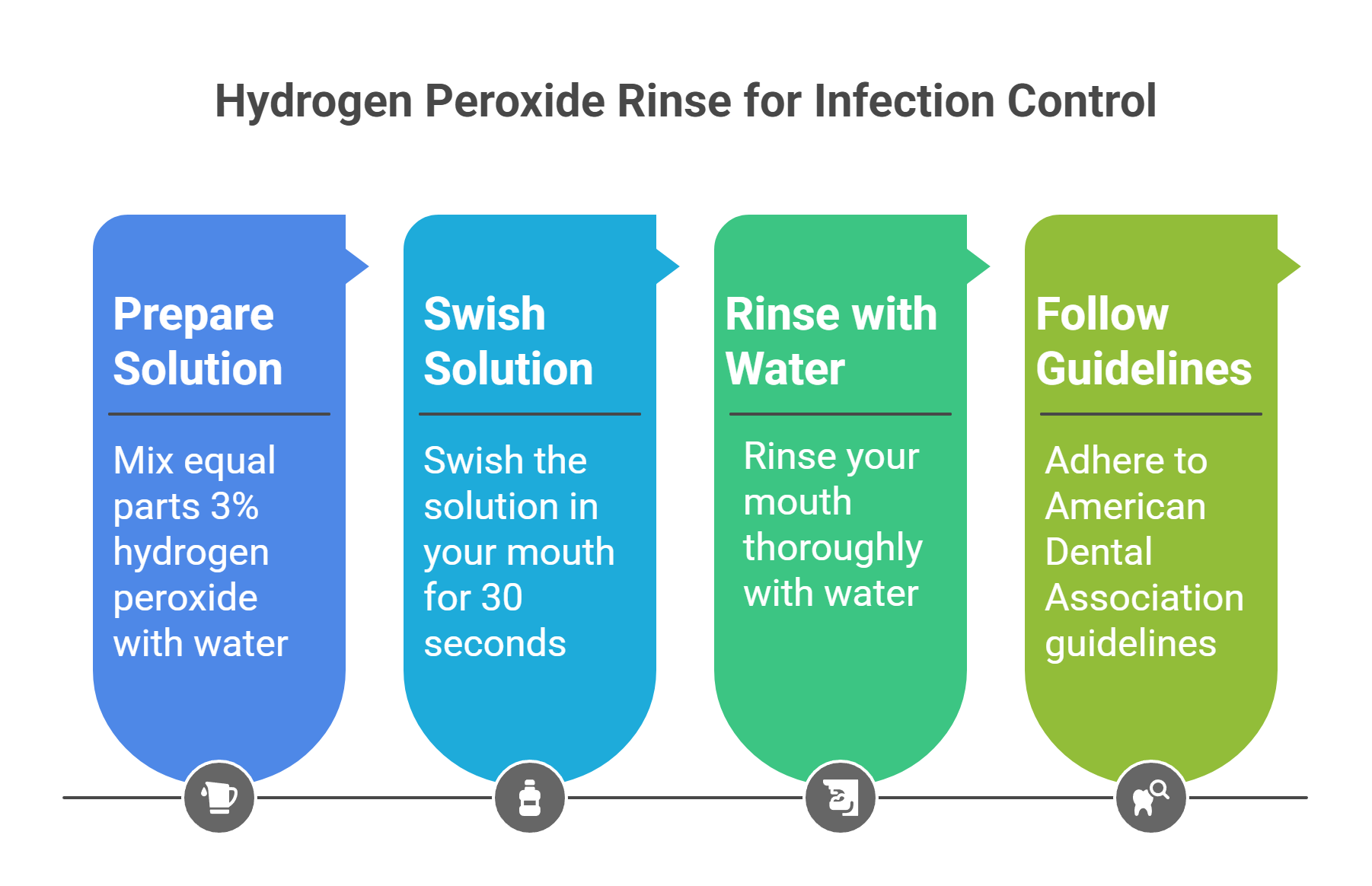
Hydrogen peroxide is an effective home remedy for tooth pain, especially for infections. This solution releases oxygen, which helps eliminate harmful bacteria in the mouth and aids in infection control. A hydrogen peroxide rinse can help kill bacteria and reduce inflammation associated with tooth pain. To prepare a hydrogen peroxide rinse, mix equal parts 3% hydrogen peroxide with water. Swish the solution in your mouth for about 30 seconds, ensuring not to swallow the mixture.
A hydrogen peroxide rinse helps break down debris and cleanse the infected area, providing pain relief and reducing plaque buildup. To use it safely:
-
Dilute hydrogen peroxide with water to avoid irritation.
-
Rinse your mouth with the diluted solution.
-
After rinsing, thoroughly rinse your mouth with water to remove any remaining hydrogen peroxide.
The American Dental Association provides guidelines for the safe use of hydrogen peroxide in oral care. Following these guidelines ensures effective and safe use of this remedy. Hydrogen peroxide rinses are a powerful tool in managing dental infections and promoting overall oral health.
Garlic: An Ancient Remedy for Toothache
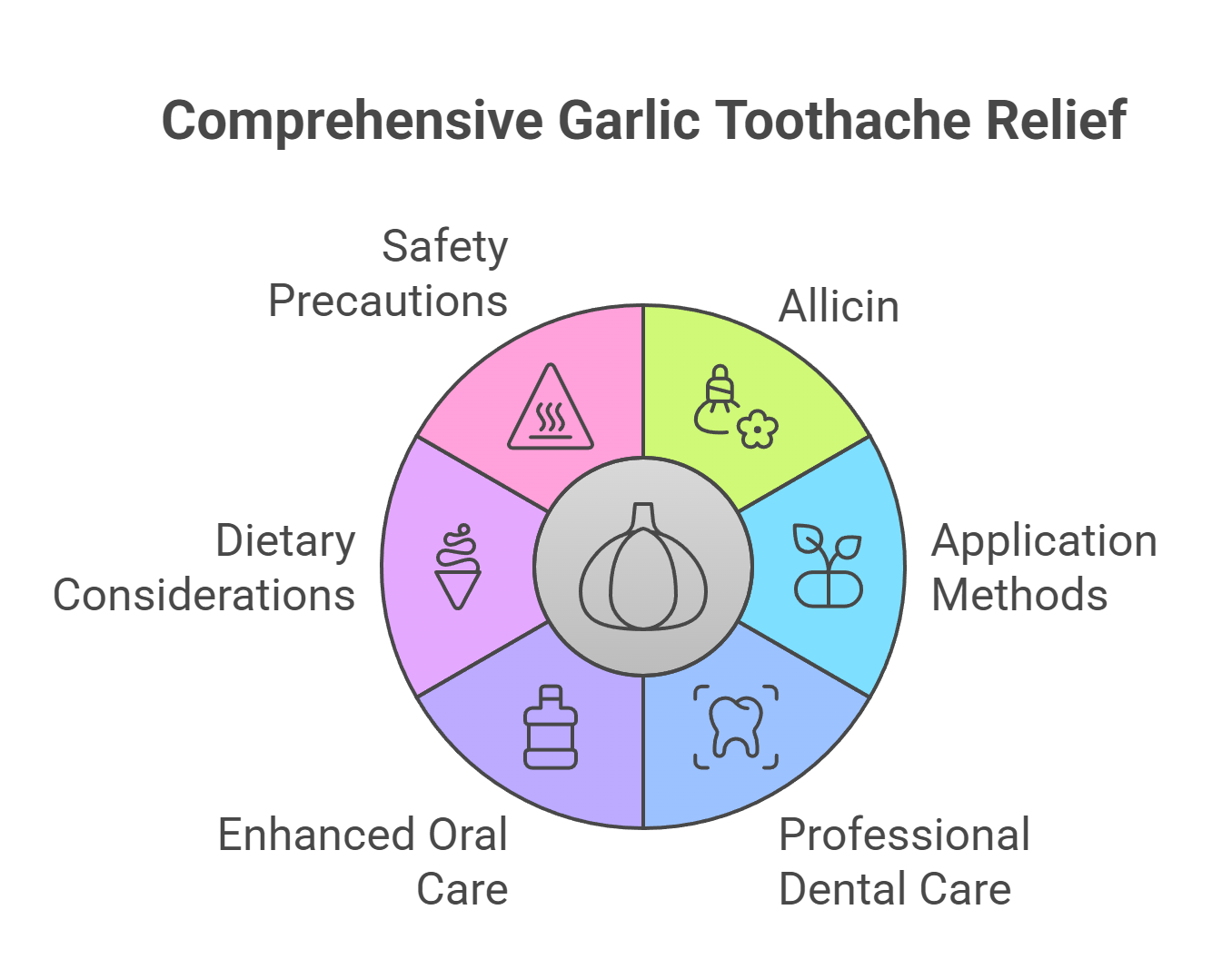
Garlic has long been celebrated for its natural healing abilities and remains a go-to natural remedy for quick relief from tooth pain. It contains allicin—a powerful compound known for its antibacterial and anti-inflammatory effects, which help target the root cause of many dental issues.
To use garlic for relief:
-
Crush a fresh garlic clove to form a paste.
-
Apply it directly to the painful area to soothe discomfort and reduce swelling.
-
Alternatively, chew a raw clove or place chopped garlic on the affected tooth to release allicin and fight infection at its source.
This method works not just to dull the pain, but also to combat the underlying cause of the issue—making garlic more than just a temporary fix. It’s particularly helpful for bacterial infections that lead to toothaches or swelling.
While garlic is widely available and offers quick relief, it’s not a substitute for professional care. If you're facing a persistent dental problem, it’s essential to see a dentist regularly to prevent complications or diagnose more serious conditions like abscesses or decay.
For enhanced oral care, consider pairing garlic use with an antibacterial mouthwash or desensitizing toothpaste to strengthen enamel and soothe sensitive teeth. Also, avoid chewing directly on the painful area, and opt for softer foods like frozen veggies (steamed) that won't irritate the site.
Lastly, be cautious with DIY remedies. While rare, misuse of some over-the-counter gels containing benzocaine can lead to a condition called methemoglobinemia, a serious issue noted by institutions like the Cleveland Clinic. Always use safe, proven methods and consult your dentist if symptoms worsen or linger.
Techniques for Severe Pain
When tooth pain becomes severe, additional techniques may be needed to manage discomfort. Numbing gels can provide temporary relief when applied directly to the painful area. These gels numb the nerves, offering quick relief from intense nerve pain. Keep your head elevated while sleeping to reduce blood flow to the head and lessen throbbing tooth pain.
Cold therapy is a powerful tool for managing severe toothache. For optimal results:
-
Apply a cold compress for about 20 minutes to temporarily reduce nerve activity and lessen pain sensations.
-
Use the cold compress intermittently, with breaks between applications.
-
Avoid very hot or cold foods to prevent exacerbating tooth pain.
In severe cases, seek professional treatment to address the underlying cause. These techniques provide temporary relief but are not a substitute for professional dental care.
When to Seek Emergency Care
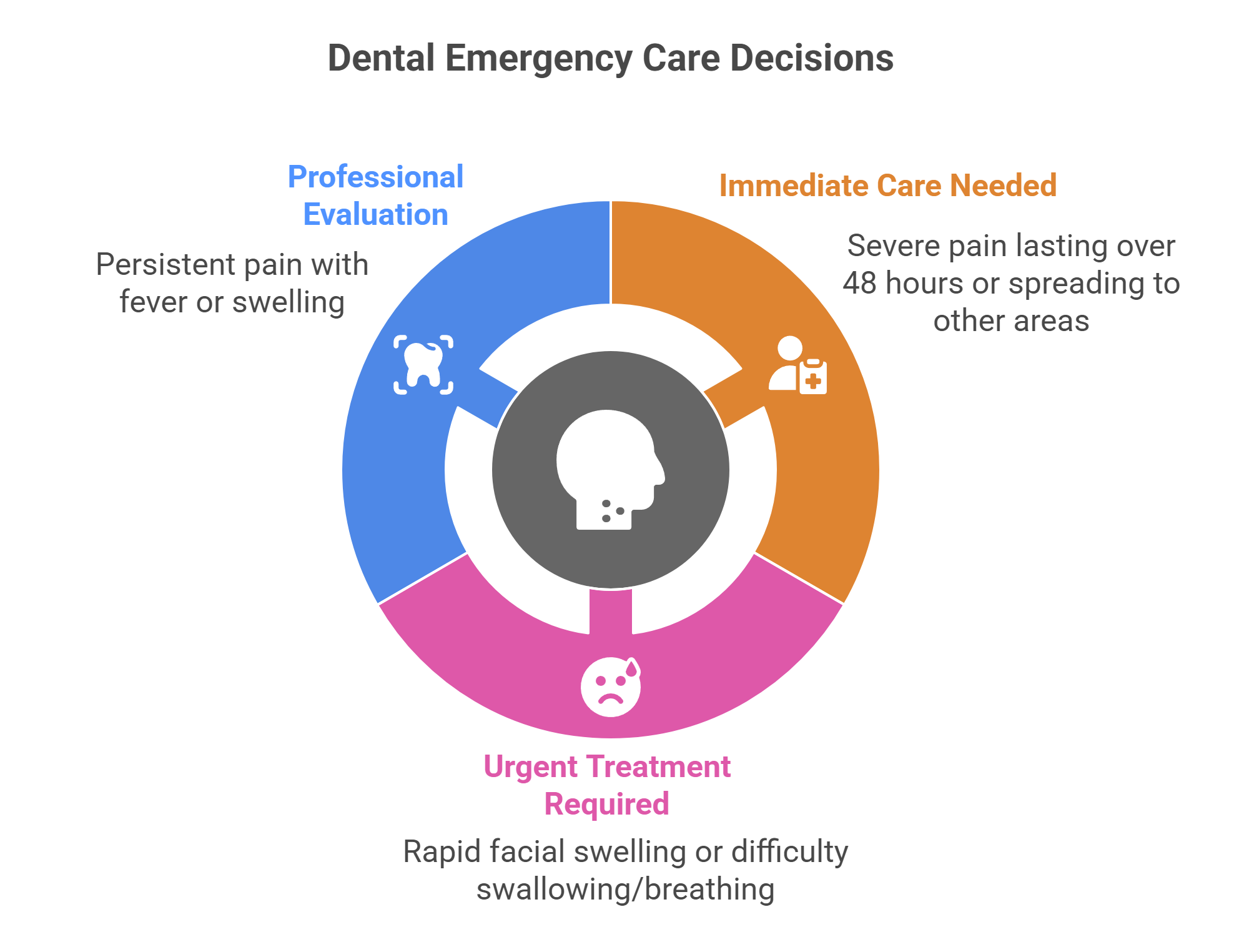
While home remedies and OTC pain relievers can provide temporary relief, there are times when immediate dental or medical attention is necessary: Dentists perform examinations and may take X-rays to identify issues causing toothaches.
-
Dental infections can lead to rapid facial swelling, which may require urgent treatment.
-
If tooth pain persists for more than a couple of days.
-
If tooth pain is accompanied by fever or swelling.
In these cases, seek immediate dental care.
Symptoms indicating a potential dental emergency that should not be ignored include:
Symptoms indicating a potential dental emergency that should not be ignored include: Difficulty swallowing, breathing, or opening your mouth. Rapid facial swelling, especially around the eye or neck, warrants prompt evaluation. Emergency dental treatment is crucial when tooth pain is severe, leading to infections if untreated.
If you experience severe pain lasting more than 48 hours or pain spreading to your ear, jaw, or neck, seek immediate care. These symptoms could signal a more serious underlying issue that requires professional intervention. Always err on the side of caution and consult a healthcare professional if unsure about the severity of your symptoms.
Important Safety Notes
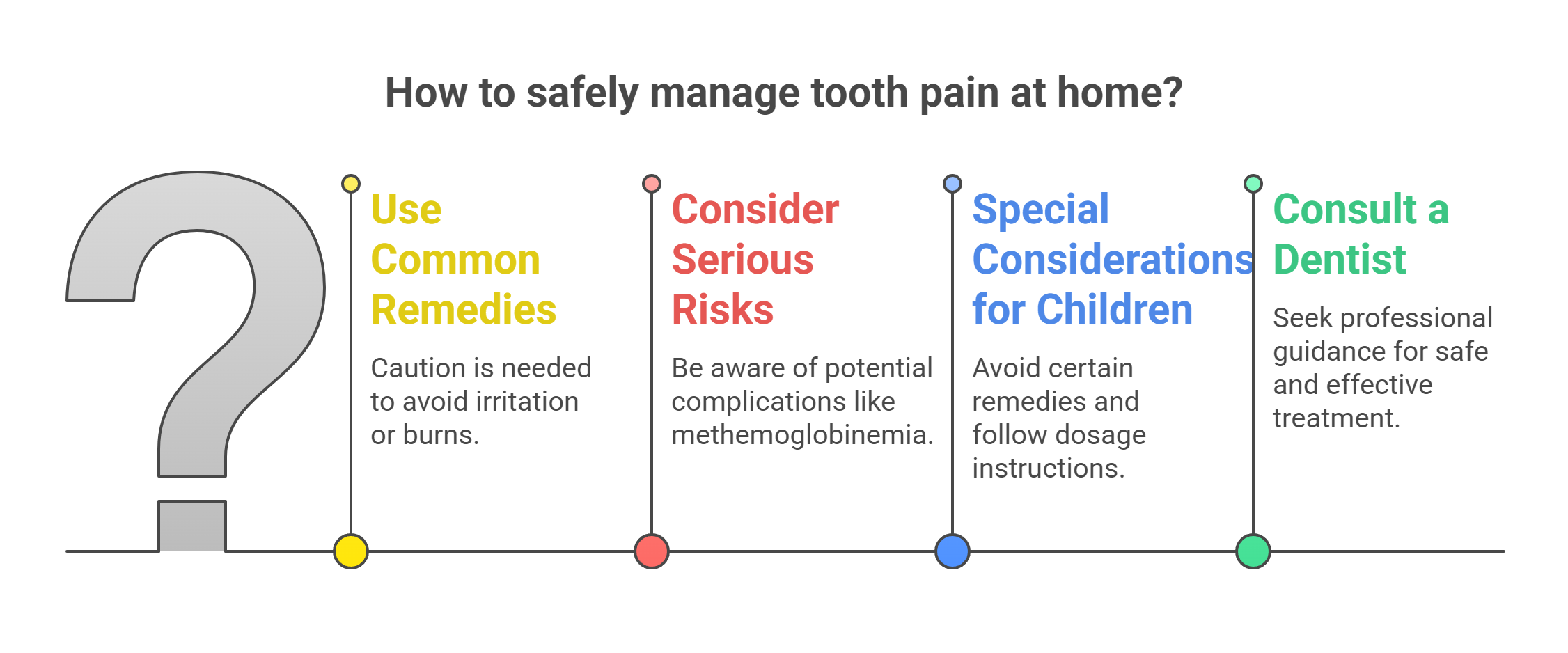
When treating tooth pain at home, safety should always be a top priority. While home remedies and over-the-counter (OTC) medications can provide temporary relief, incorrect use may lead to further complications.
Use Caution with Common Remedies
-
Saltwater rinses should be avoided if you have an open nerve or cavity, as they can increase irritation.
-
Clove oil must be diluted with a neutral carrier oil (such as coconut or olive oil) to prevent burning or irritation to gum tissue or the painful area.
-
Do not apply pain relievers directly to the gums. This can damage the tissue and lead to chemical burns.
Be Aware of Serious Risks
-
Products containing benzocaine, commonly found in numbing gels, have been linked to a rare but serious condition called methemoglobinemia, which affects the blood’s ability to carry oxygen.
-
Always consult a healthcare professional before using benzocaine-based products, particularly for children under the age of two.
Special Considerations for Children
-
Avoid saltwater rinses and benzocaine products for young children due to risks of swallowing and adverse reactions.
-
Follow the recommended dose on any OTC medication and never exceed it.
If you're unsure about a remedy or your symptoms worsen, it is important to see a dentist. Professional guidance ensures the root cause is addressed safely and effectively.
Summary
Tooth pain can be debilitating, but with the right remedies, you can find quick and effective relief. Over-the-counter pain relievers like ibuprofen and acetaminophen provide fast pain relief, while natural remedies such as cold compresses, saltwater rinses, clove oil, hydrogen peroxide rinses, and garlic offer accessible and effective solutions. For severe pain, techniques like using numbing gels and keeping your head elevated can help manage discomfort.
It’s crucial to recognize when professional dental care is necessary. Persistent tooth pain, facial swelling, fever, and difficulty swallowing are signs that immediate medical attention is needed. Home remedies and OTC medications are excellent for temporary relief, but they should not replace professional dental care.
By incorporating these remedies and safety tips into your routine, you can effectively manage tooth pain and improve your overall dental health. Brushing your teeth twice daily helps prevent toothaches. Remember, prevention is key, so maintain good oral hygiene and visit your dentist regularly to prevent toothaches.
Frequently Asked Questions
What should you do if a toothache persists for more than a couple of days?
If a toothache lasts for more than a couple of days, it's crucial to see your dentist for proper diagnosis and treatment. Ignoring it could lead to more serious dental issues.
How can you prepare a saltwater rinse for tooth pain relief?
To relieve tooth pain, mix half a teaspoon of salt in 8 ounces of warm water and swish it in your mouth for 30 seconds, repeating this up to 4-5 times daily. This simple remedy can help reduce inflammation and discomfort.
What are the benefits of using clove oil for tooth pain?
Using clove oil for tooth pain can provide temporary relief due to its active component, eugenol, which has anti-inflammatory and numbing properties. Applying it with a cotton ball soaked in diluted oil can effectively alleviate discomfort.
When should you seek emergency dental care for tooth pain?
You should seek emergency dental care if you experience rapid facial swelling, fever, difficulty swallowing or breathing, or if the tooth pain persists for more than 48 hours. Prompt attention is crucial to address potentially serious dental issues.
What safety precautions should be taken when using home remedies for tooth pain?
When using home remedies for tooth pain, it is essential to avoid saltwater rinses if there is an open cavity, refrain from applying pain relievers directly to the gums, and consult a healthcare professional before using benzocaine products, especially for children under two. Prioritizing these precautions ensures your safety while managing tooth pain.














































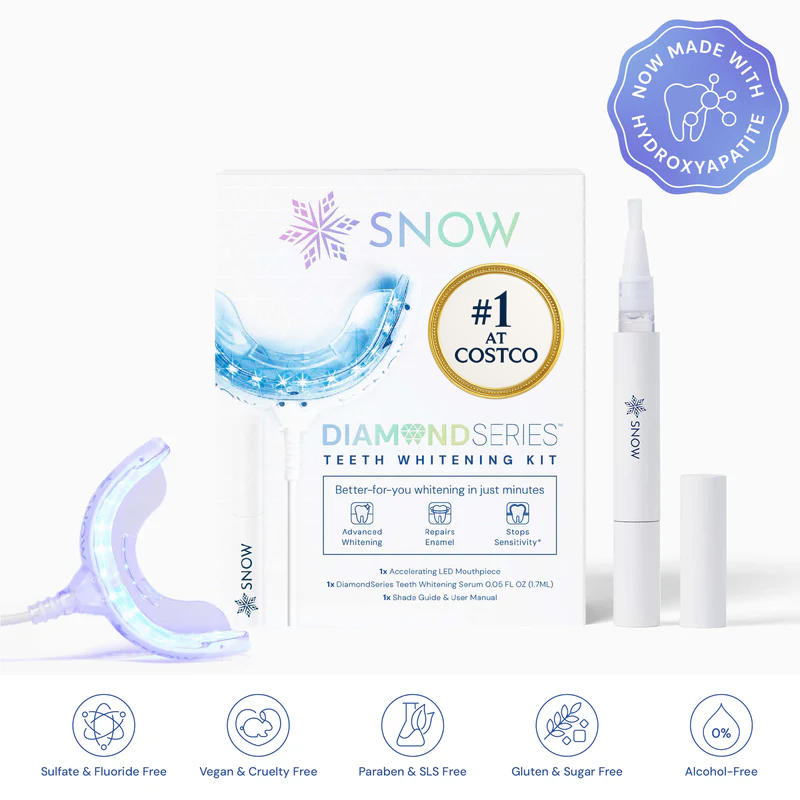
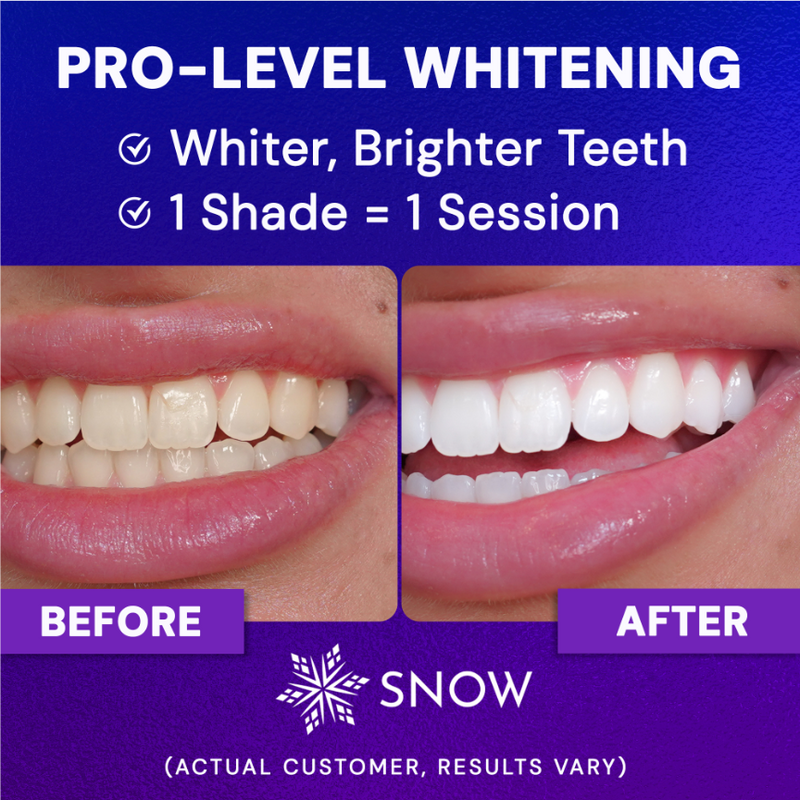

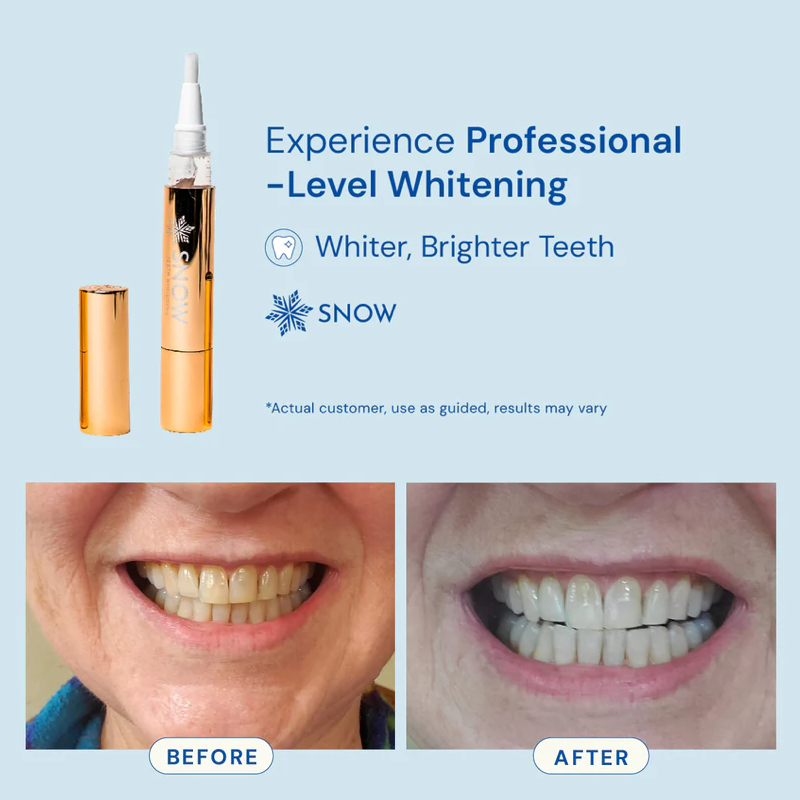









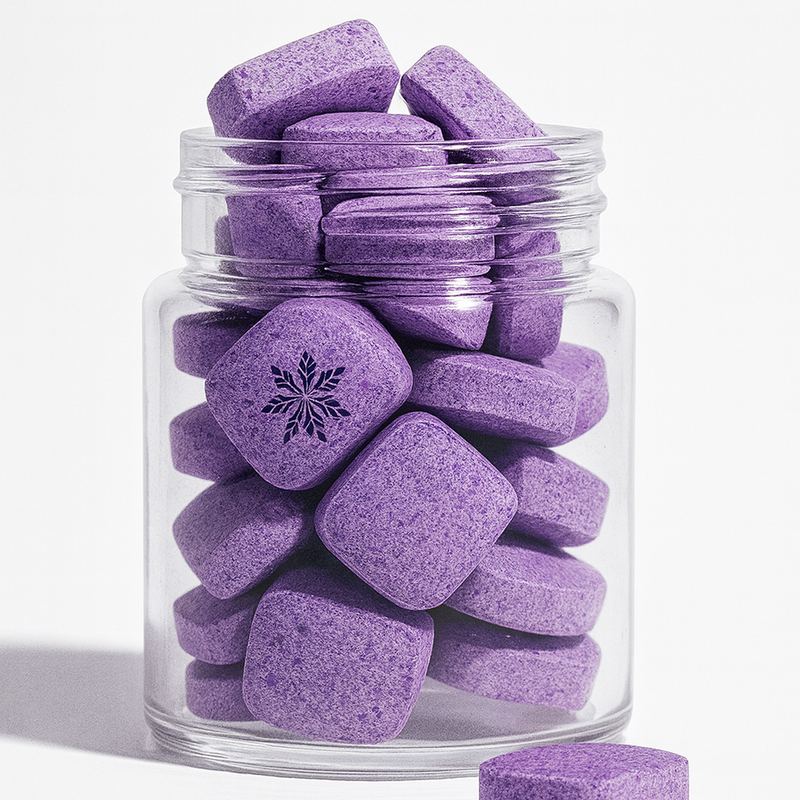






![Clove Oil for Toothache Relief [Does it Really Work]](http://www.trysnow.com/cdn/shop/articles/clove_oil_for_toothache_does_it_really_work.png?v=1756135924)
